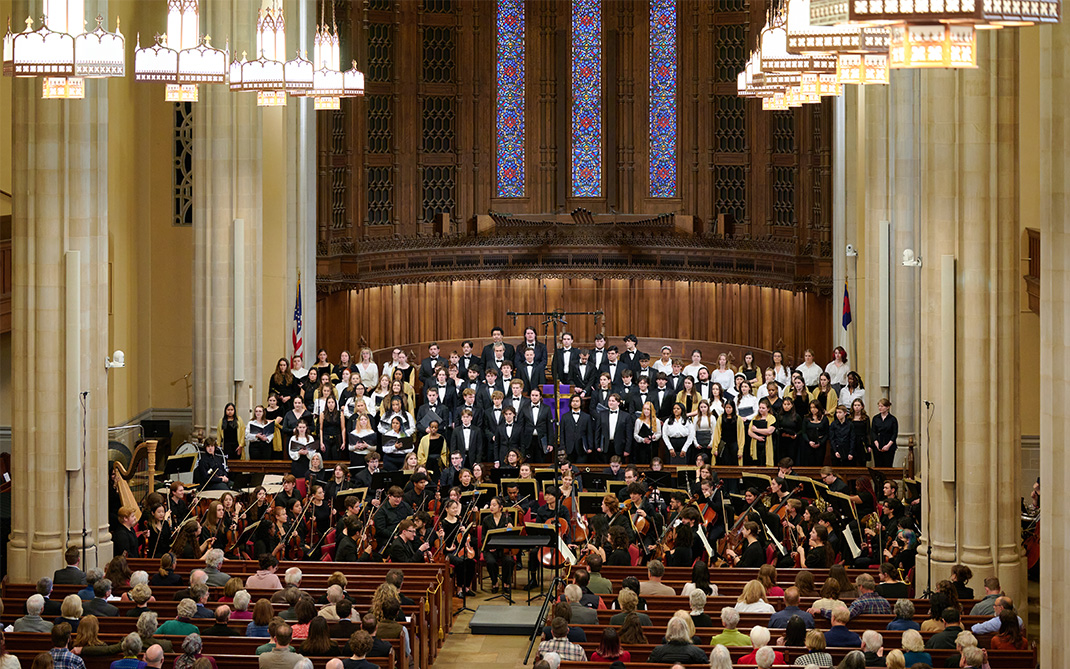UNCSA lifts the spirit - and the economy
Money can’t buy happiness, but it buys plenty of movies and music, theatre tickets and concert passes, good reads and great art. And if that’s not a means to happiness, I’m in the wrong line of work.
As Chancellor of the University of North Carolina School of the Arts (UNCSA), I can assure any dubious parent or anxious student that the skills we teach are very much in demand. The cliché of the impoverished theatre major has been around so long that it’s easy to disregard the global scale of the arts industry or discount reams of studies showing how creative entrepreneurs drive growth and innovation. Our country has a thriving artistic economy, and our graduates excel in every field imaginable.
The theatre majors I know can meet tough deadlines, absorb tons of information, collaborate with demanding personalities, think on their feet, own any room, and conquer any challenge. That’s how a recent UNCSA drama grad rose quickly through the ranks at Google, and how a theatre major like Michael Eisner ended up running Disney.
In 2015, North Carolina’s creative sector generated more than $26 billion in revenues, with more than $10 billion in exports. Creative industry jobs—professions like design, writing, motion graphics and performing arts—grew by more than 21 percent from 2006-2015. At a time when our state and our country are looking for ways to offset declining sectors, the arts offer a promising way forward.
None of this should be a revelation. The United States runs a persistent trade deficit when it comes to manufacturing, but we generate a whopping $30 billion international trade surplus in arts and entertainment. The largest and most profitable exports of mass-produced “American Made” products have long included movies, television shows, and music. Consumers from Canada to China buy up our creative output and look to the American arts industry for ideas and innovation. Diplomats call this “soft power,” and it leads to both cultural influence and hard currency for U.S. businesses.
UNCSA’s comparative advantage in these fields means more jobs for our graduates in an increasingly mobile and flexible society. The growth of new distribution channels—streaming devices, video games, and virtual reality apps—has created unprecedented demand for creative talent. It gives me enormous pride to see our alumni finding great work in sound design, motion capture, screenwriting, set production, animation, themed entertainment, story development, and new media roles across the globe.
But my greatest satisfaction isn’t reflected in salary figures or job placement statistics. It comes from seeing how a small arts conservatory can serve as such a wellspring of joy, and learning how UNCSA develops artists to share that joy—not just for entertainment, but to improve the human condition for all of us.
UNCSA was born of a unique vision to unleash the creative potential of gifted young people who could inspire the state and lift our collective imagination. From music directors in small-town churches to artistic directors on world stages, our top-ranking programs have been a prolific source of cultural capital in North Carolina and beyond.
Arts education isn’t just a means to an economic end; our school’s founders recognized it as a civic and moral imperative to stir hearts and stimulate minds. When North Carolina established the country’s first state symphony orchestra, it wasn’t to sell more concert tickets; it was to make our state a richer, more sublime place to live. When we opened the country’s first state art museum, it wasn’t to reap tourist dollars; it was to put some of the world’s greatest artistic treasures within reach of all North Carolinians.
We’re a proud part of that legacy.
For more than half a century, UNCSA has stayed true to its founding mission to serve and enrich “the cultural and economic prosperity of the people of North Carolina and the nation.” Our alumni shape popular culture through their work on blockbuster successes like “Star Wars” and “Hamilton” and entertainment juggernauts like Cirque du Soleil. Our deans are partnering directly with arts industry pioneers to get the latest technology in classrooms. Our nascent Institute for Performance Innovation will incubate breakthroughs in virtual and augmented reality, support creative startups, and revolutionize not only entertainment but also education, engineering, and scientific research. Our curriculum will adapt to developments in animatronics, immersive filmmaking, arts medicine, and music technology. Most importantly, our students will discover career pathways few of us would have imagined just a short time ago.
North Carolina has always blazed its own path in education, especially arts education. This is no time to veer off course. To live and work among our students is to know that matters of the human spirit are more vital than ever—for our happiness, as well as our prosperity.
EdTalks, Higher Education Works
July 14, 2017



